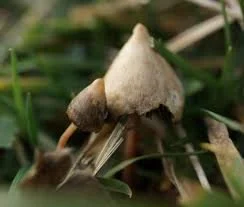
UP-TO-DATE, RESEARCH BASED INFORMATION ABOUT PSYCHEDELICS.
On minimizing risk and harm in the use of psychedelics
The authors outline important gaps in our knowledge around the safety and risk profile of psychedelic medicines and identify practical steps forward for researchers and clinical practitioners to make this promising field safer.
A qualitative analysis of the psychedelic mushroom come-up and come-down
The come-up is more often characterized by negatively valenced feeling states that resemble an acute stress reaction, while the come-down phase is more often characterized by positively valenced feeling states of the sort often observed following recovery from illness or resolution of stress.
Psilocybin-assisted psychotherapy for methamphetamine use disorder: A pilot open-label safety and feasibility study
Psilocybin assisted psychotherapy for methamphetamine use disorder was feasible to implement in an outpatient setting, did not appear to generate safety concerns, and demonstrated signals of effectiveness warranting further investigation.
Psychedelic research recap January 2025
We only added 11 (January) studies to the database. More studies than ever are reviews, commentaries, and perspectives. Though they can provide a great introduction for a specific audience.
From relaxed beliefs under psychedelics (REBUS) to revised beliefs after psychedelics (REBAS)
Confidence in negative self-beliefs decreased following 25 mg psilocybin. Entropy and subjective effects under 25 mg psilocybin correlated with decreases in negative self-belief confidence (acutely and at 4-weeks). Particularly strong evidence was seen for a relationship between decreases in negative self-belief confidence and increases in well-being.
Preliminary synthetic 5-MeO-DMT phase 2 results
The hallucinogenic compound 5-MeO-DMT comes from the secretions of Bufo alvarius, also known as the Sonoran Desert toad. This week, two companies developing synthetic forms of the substance as medical treatments announced preliminary results.
Oregon’s emerging psilocybin services workforce: A survey of the first legal psilocybin facilitators and their training programs
This study describes Oregon’s early psilocybin facilitator workforce and assesses state-approved training programs.
Psychedelic futures and altered states in the religions of the ancient Mediterranean
The origins of the ancient Greek Eleusinian Mysteries are lost to time. We know that from the classical period onward, on a specified day in the third month of the Attic calendar (roughly September or October), initiates would walk the fourteen miles from Athens to the town of Eleusis along the “Sacred Road” to celebrate the Greater Mysteries.
MindMed announces first patient dosed in Panorama, the second pivotal phase 3 study of MM120 in generalized anxiety disorder
Panorama is the second Phase 3 trial of lysergide D-tartrate (LSD) with the primary endpoint measuring the change from baseline in the Hamilton Anxiety Rating Scale (HAM-A) score at week 12 for MM120 Orally Disintegrating Tablet (ODT) 100 µg vs placebo.
An overview of currently active psychedelic research trials
This overview seeks to map out drug discovery & development activity in psychedelics. Candidates currently undergoing clinical trials are presented first, while those that are at the discovery or preclinical stage are catalogued in the latter half of this page.
FDA OKs esketamine nasal spray monotherapy for resistant depression
The US FDA has approved a supplemental new drug application allowing esketamine nasal spray to be used as a standalone treatment in adults with major depressive disorder who have not responded adequately to at least two oral antidepressants.
American Journal of Bioethics, January edition
The January edition of the American Journal of Bioethics focuses just on psychedelics. There are a couple of editorials and then four 'target articles' with a further twenty six article commentaries.
Psilocybin-assisted group psychotherapy + mindfulness based stress reduction (MBSR) for frontline healthcare provider COVID-19 related depression and burnout: A randomized clinical trial
Group psilocybin-assisted therapy plus MBSR was associated with clinically significant improvement in depressive symptoms without serious adverse events and with greater reduction in symptoms than MBSR alone.
An examination of internal family systems interventions for trauma with implications for ethical psychedelic-assisted treatment
The body of IFS literature is extensive, enthusiastic, and thought-provoking. Outcome data for applying the model to Post-Traumatic Stress Disorder are limited.
Integration of personal psychedelic experiences into clinical practice: A phenomenological study in mental health professionals
The aim of this study was to explore the psychological and spiritual dimensions of psychedelic integration among mental health professionals, focusing on understanding how transformation and insights influence their clinical work.
Therapeutic potential of psilocybin for treating psychological distress among survivors of adverse childhood experiences: Evidence on acceptability and potential efficacy of psilocybin use
Taken together, these findings suggest that psilocybin therapy may be potentially acceptable and may feasibly help in supporting survivors of adverse childhood experiences with particularly strong benefits to those with more severe childhood adversity.
Psychedelics for the treatment of obsessive–compulsive disorder: Efficacy and proposed mechanisms
This review will evaluate the evidence supporting the theory that psychedelics can be used for the treatment of OCD, as well as the data regarding claims about their mechanisms. It will also discuss issues with the current evidence and the ongoing trials of psilocybin that aim to address these knowledge gaps.
Psychedelics for the treatment of psychiatric disorders: Interpreting and translating available evidence and guidance for future research
The overarching aims in this overview are 1) to review methodological aspects that affect inferences and interpretation of extant psychedelic studies in psychiatric disorders, and 2) to provide guidance for future research and development of psychedelic treatment in psychiatry, critical to study interpretation and clinical implementation.
Compass psychological support model for COMP360 psilocybin treatment of serious mental health conditions
The primary benefit of such a (Compass Pathways) framework is to support a safe and meaningful psilocybin experience. It also enables future research on the facets of psychological support and/or psychotherapy that most optimally complement psilocybin treatment.
Psychedelics in psychiatry: Oh, what a trip!
We are delighted to introduce this special issue of the American Journal of Psychiatry on psychedelics. This marks a moment of legitimacy for what was once considered a fringe, fledgling movement driven solely by a select group of zealously dedicated scientists and clinicians. In contrast to this early nascent period, the enthusiasm, interest, and pursuit of scientific and medical research on the psychiatric applications of psychedelic compounds has exploded in recent years, leading to the declaration of the current phase as a “renaissance” period for psychedelic research.




















